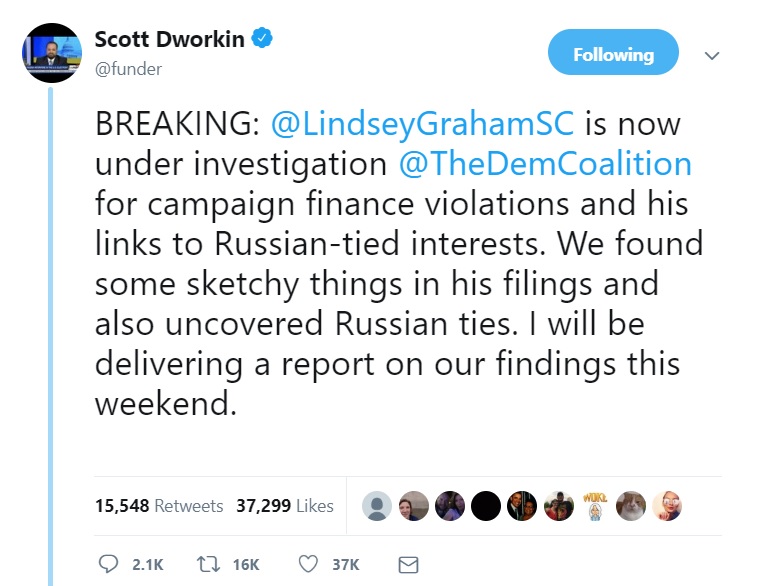After the news cycle of the last few months, Americans are painfully, acutely familiar with the face of a Senator that, until the Kavanaugh hearings, we had no idea had the capacity for a public psychotic break. Clinically speaking, the outburst we saw from Lindsey Graham of South Carolina was likely not a display of psychosis. But the faces that he made as he decried what he considered to be a betrayal by Democrats over the nomination of Brett Kavanaugh to the Supreme Court showed him to be a man who is different than he has ever led us to believe in the past.
Now he’s the chair of the Senate Judiciary Committee.
In fact, many see Senator Graham as a different man now than even during 2016, when he railed against the nomination of Donald Trump as the Republican candidate for President. Some even believe that Trump himself, perhaps during some of the many rounds of golf he has played with Graham since the election, has privately told the 22-year member of Congress about something that could be devastating to his career if it were made public, and warned him against opposing his agenda.
That could never be proven, of course. But Graham’s behavior shift certainly suggests it. And although many people forget it because of the controversy surrounding the DNC hack and the hack of Hillary Clinton’s emails by Russian operatives, the fact is that the Republicans were hacked as well, including Lindsey Graham’s emails.
To this day, no one knows what happened to those emails. They have never been released by any group.
Is there something in those emails that Donald Trump knows about because of his concern over the Russia probe?
That, and one other shocking possibility that I’ll get to in a moment, are possible reasons that the Democratic Coalition has opened an investigation into Graham’s links to the hostile foreign power that made an attempt at — and partially succeeded in — corrupting American democracy. Coalition founder Scott Dworkin announced the investigation:

What could those “sketchy things” have been? Well, no one here at DC Tribune has contacts inside the Democratic Coalition, but I’ve done plenty of analysis myself if you’ve been following me here, and the first example of a place to look would be at the $800,000 that Graham’s political action committee took from Len Blavatnik, a citizen of the US and UK who emigrated from the USSR in the 1970s with his family and returned to Russia after the collapse of the Soviet Union.
Blavatnik is the business partner of Viktor Vekselberg in Rusal, the world’s second-largest aluminum manufacturer, which was founded by Oleg Deripaska. Do those names sound familiar? They should by now. Vekselberg is the Russian billionaire who was discovered in May to have been funneling secret payments to former Trump lawyer Michael Cohen through the same shell company that Cohen set up to disburse payments to Trump’s mistresses, Essential Consultants. Deripaska is the Putin ally who worked with former Trump campaign chairman Paul Manafort to lobby the United States in efforts that would benefit Putin’s Kremlin. Toward the middle of Manafort’s first trial, it was discovered that Deripaska had loaned him ten million dollars in an unsecured contract.
Len Blavatnik is a US citizen and his contributions to Graham’s PAC would not be illegal if 100 percent of the money could be proven to have come from American income. But if any of that almost one million dollars he sent to Graham came from Rusal, it would look more than “sketchy” — it would be a blatant campaign finance violation.
Featured image via screen capture
